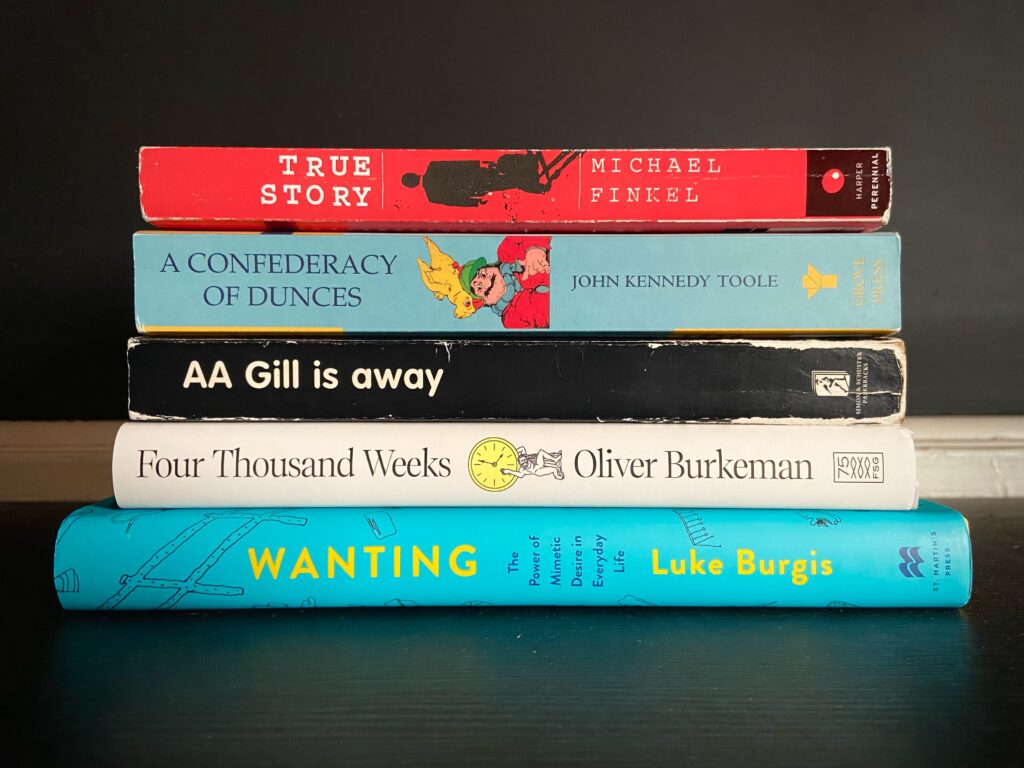
I thought 2021 would be less of a time warp than 2020. I was wrong. We got stuck in a 365-day limbo period between the old normal and the new normal, and by the time we caught our breath the year was over—again.
One antidote for chaos is a daily routine, which for me includes reading first thing in the morning. It’s way easier to make a dent in a book before email, work, and social media inevitably drain your mental energy. Anyway, out of all the books I read in 2020, I wanted to highlight five that are worth re-reading.
But first, a shameless plug. If you subscribe to my newsletter, you know I have a book of my own coming out soon. I hoped it would be finished in time for the holidays, but after some unexpected delays we’re looking at an early 2022 release date.
In the meantime, you can drop your email below to get a teaser for the book and first dibs on pre-order bonuses as soon as they’re available.
Now, onto some recommendations.
Four Thousand Weeks: Time Management for Mortals by Oliver Burkeman

Most productivity writers tell you how to use your time. Burkeman questions whether time is something you can even “use” in the first place. If that sounds meta or Zen-like, that’s because it is. Once you accept that life is a never-ending conveyor belt of to-dos, you can start living like a human being instead of a machine.
I can’t do this book enough justice in two paragraphs. If you’re a recovering productivity nerd who’s burnt out with tools, gimmicks, and empty platitudes, buy this book immediately.
Favorite quote: “Nobody in the history of humanity has ever achieved ‘work-life balance,’ whatever that might be,” he writes, “and you certainly won’t get there by copying the ‘six things successful people do before 7 a.m.’”
A.A. Gill Is Away by A.A. Gill

The late A.A. Gill makes today’s travel writers/bloggers sound like dilettantes. From famine-stricken Sudan to porn studios in California, Gill has a super-human knack for making you feel like you’re right beside him: seeing the sights and conversing with locals. This collection of essays was published in 2005, but they’re perennially fascinating, hilarious, and (depending on your taste) offensive.
Favorite quote: “Most journeys in all of the world start not with bright expectations, a sense of adventure or a bucket and spade, but an empty stomach.”
Wanting: The Power of Mimetic Desire in Everyday Life by Luke Burgis

Why do you want the stuff you want? The answer is disappointing—or liberating, depending how you view it.
Wanting is based on the French philosopher Rene Girard’s theory of “mimetic desire,” which states that we want things simply because other people want them too. This force affects everything from high school dating scenes to Wall Street board rooms. The only way out is, paradoxically, to accept that you don’t desire anything independently—even if you’re a self-proclaimed iconoclast.
I guarantee this book will make you rethink your job, your friends, your wardrobe, and more.
Favorite quote: “An unbelieved truth is often more dangerous than a lie.”
True Story: Murder, Memoir, Mea Culpa by Michael Finkel

After being ousted from the New York Times for fabricating a story, Michael Finkel became pen pals with one of America’s most wanted murderers, Christian Longo. Why? Because Longo randomly decided to assume Finkel’s disgraced identity after fleeing to Mexico.
Finkel’s first-person narrative of his bizarre experience reads like a thriller novel. But as the title implies, this is a true story—one that’s too wild to fabricate. If I didn’t have to work, I would’ve read this book in one sitting.
Favorite quote: “I hated him in the intense way that you can only hate someone you’d once truly cared about.”
A Confederacy of Dunces by John Kennedy Toole

You might not think a novel written in the 70s by a literature professor could make you laugh out loud, but you’d be wrong. Dunces chronicles the misadventures of Ignatius J. Reilly, a slovenly, grouchy, obese, self-described intellectual who lives with his mom. Between his bouts of writing, Reilly works (and fails miserably) as a hot dog vendor and a file clerk at a pants company. The dialogue, storylines, and attention to detail are all genius-level.
John Kennedy Toole tried for more than a decade to publish his book, but his failure tragically drove him to suicide. It wasn’t until Toole’s mother showed the manuscript to the novelist Walker Percy that it was published. Eleven years after his death, Toole was posthumously awarded the Pulitzer Prize for Fiction.
Favorite quote: “I am at the moment writing a lengthy indictment against our century. When my brain begins to reel from my literary labors, I make an occasional cheese dip.”
I hope you enjoy these books as much as I did. Speaking of books, don’t forget to join my newsletter to get a sneak peak of my upcoming book and first access to pre-order bonuses.